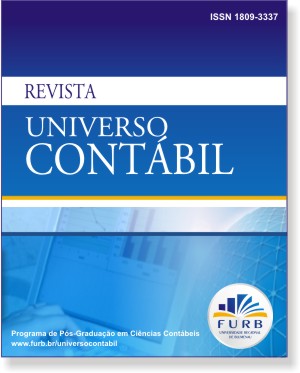AUDITORÍA INTERNA MEDIOAMBIENTAL BASADA EN LA GESTIÓN DEL RIESGO CORPORATIVO: UN CASO DE ESTUDIO
DOI:
https://doi.org/10.4270/ruc.20084Palavras-chave:
Auditoría interna, Auditoría medioambiental, Modelo de gestión de riesgo corporativo (ERM).Resumo
O trabalho aborda a importância da auditoria interna de meio-ambiente para garantir, com razoável segurança, que por meio dos seus sistemas de gestão a política meio-ambiental seja eficaz e eficiente na proteção e melhoria do meio-ambiente. Por meio de uma revisão de literatura, verifica-se que o sistema de gestão meio-ambiental requer uma supervisão contínua por parte de profissionais preparados e dotados de conhecimentos e metodologias adequadas e atuais para garantir seu cumprimento por meio de uma gestão de risco corporativo. A função da auditoria interna é a ideal para fazê-lo devido às suas atribuições. São pesquisadas, por meio de um estudo de caso, as vantagens e os pontos fracos de um modelo, muito recente, aplicável a uma auditoria interna meio-ambiental: o Enterprise Risk Management (ERM) - integrated framework. Conhecer os resultados da aplicação prática deste modelo ajuda a conhecer sua utilidade e suas limitações, além de estabelecer padrões de conduta para futuras implementações, auxiliando as organizações a desenvolver uma gestão mais comprometida com o meio-ambiente.Downloads
Downloads
Como Citar
Edição
Seção
Licença
Os direitos autorais para artigos publicados nesta revista são do autor, com direitos de primeira publicação para a revista. Em virtude de aparecerem nesta revista de acesso público, os artigos são de uso gratuito, com atribuições próprias, em aplicações educacionais e não-comerciais. A revista permitirá o uso dos trabalhos publicados para fins não-comerciais, incluindo direito de enviar o trabalho para bases de dados de acesso público. Os artigos publicados são de total e exclusiva responsabilidade dos autores.
• O(s) autor(es) autoriza(m) a publicação do artigo na revista;
• O(s) autor(es) garante(m) que a contribuição é original e inédita e que não está em processo de avaliação em outra(s) revista(s);
• A revista não se responsabiliza pelas opiniões, ideias e conceitos emitidos nos textos, por serem de inteira responsabilidade de seu(s) autor(es);
• É reservado aos editores o direito de proceder ajustes textuais e de adequação do artigo às normas da publicação;
• O(s) autor(es) declaram que o artigo não possui conflitos de interesse.


